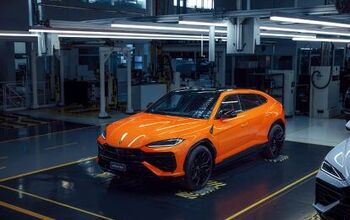The Dream of 2009 is Alive in 2017: Volkswagen Named Sales Winner, by a Hair

It’s a good news kind of day in Wolfsburg, despite fears of further indictments from U.S. authorities and an ongoing investigation by pesky German investigators.
After spending years jockeying with rival Toyota for the sales crown, Volkswagen finally pulled ahead in 2016 to become the world’s top automaker, fulfilling a goal set in 2009. The architect of that global dominance strategy — ex-CEO Martin Winterkorn — might not share the elation of his former colleagues, as he is currently under investigation for fraud.
In total, Volkswagen Group divisions delivered 10.3 million vehicles last year, topping Toyota’s tally by a thin margin. The previously best-selling automaker sold 10.2 million, making this race something of a photo finish.
Still, despite the closeness of the results, a podium is a podium. The scandal-plagued automaker saw its global sales fall significantly in 2015, hitting 9.9 million for the year, but controversy wasn’t enough to stop growing demand for the brand in China, as well as the surging popularity of the premium Audi and Porsche brands.
Meanwhile, Toyota saw its sales rise modestly from just under 10.1 million units sold in 2015. The latest full-year tally is less than the 10.3 billion the automaker recorded in 2014.
Both automakers are counting on new or refreshed utility vehicles to stimulate U.S. sales. Toyota will launch the C-HR crossover this year, while Volkswagen recently released the midsize Atlas and a larger Tiguan. It’s difficult to predict how an increased emphasis on style at the traditionally staid Toyota will play out with buyers.
The folks in Wolfsburg has best enjoy this victory, as there are growing signs that next year could see the automaker cede the crown to its rival. Headwinds are growing in key markets, Bloomberg reports. In China, a small-engine tax looms, threatening to snuff out the brand’s growth. Meanwhile, VW plans to scale back the leasing fleet it makes available to its vast German workforce.
There’s also the unanswered question of how President Trump’s proposed trade policies will impact European automakers — making for a year of uncertainty, and not just for Volkswagen.
[Image: Volkswagen]

More by Steph Willems
Latest Car Reviews
Read moreLatest Product Reviews
Read moreRecent Comments
- Bd2 If I were going to spend $ on a ticking time bomb, it wouldn't be for an LR4 (the least interesting of Land Rovers).
- Spectator Wild to me the US sent like $100B overseas for other peoples wars while we clammer over .1% of that money being used to promote EVs in our country.
- Spectator got a pic of that 27 inch screen? That sounds massive!
- MaintenanceCosts "And with ANY car, always budget for maintenance."The question is whether you have to budget a thousand bucks (or euro) a year, or a quarter of your income.
- FreedMike The NASCAR race was a dandy. That finish…


































Comments
Join the conversation
Although so many believed VW to be Number Two, Volkswagen has prevailed, and is actually Number One. It just may prove be Number Two next year.
What? Where are all the TTAC armchair experts who kept telling us that VW is finished and we should expect to see them in bankruptcy? The inability of many Americans to comprehend there is a world outside their borders never ceases to surprise.